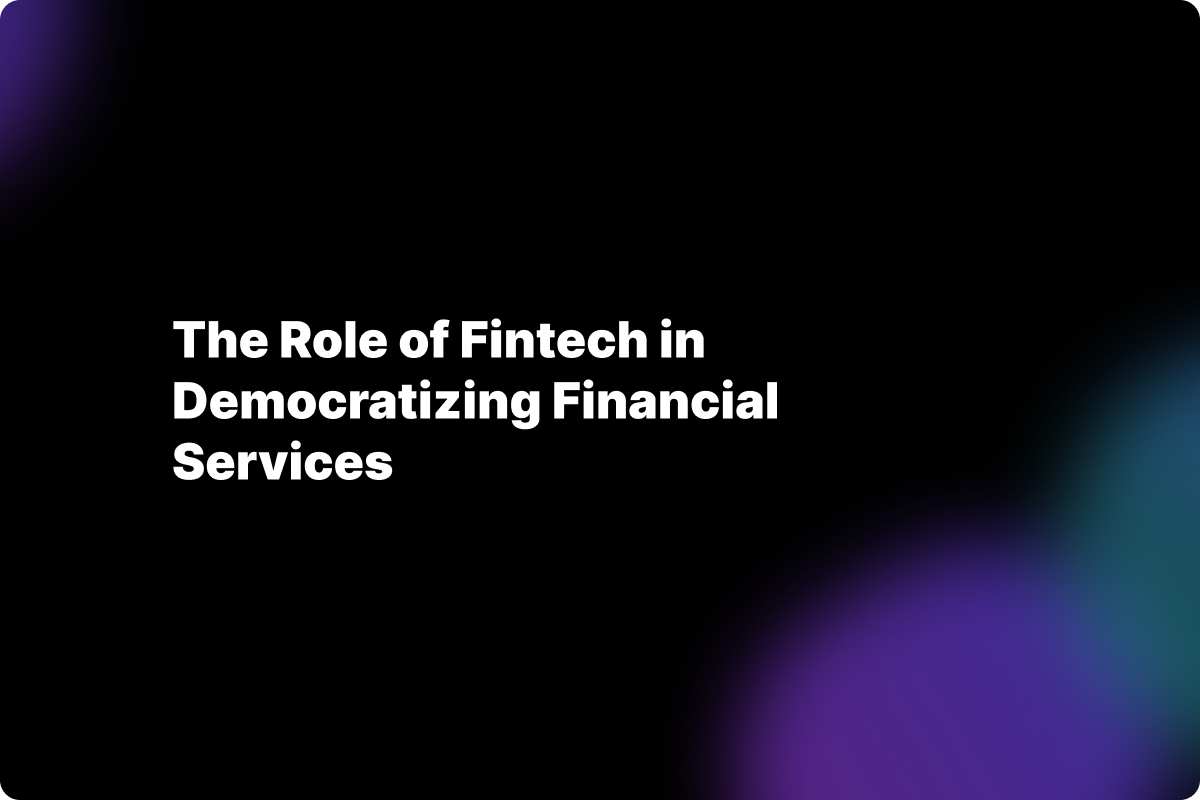The Role of Fintech in Democratizing Financial Services
As a seasoned expert in the evolving landscape of financial technology, I’ve witnessed firsthand the transformative power of fintech in making financial services more accessible and equitable. The advent of fintech has not only revolutionized the way we manage personal finances but has also played a pivotal role in bridging the gap for those traditionally underserved by the banking sector. From the surge in mobile payments and digital wallets to the innovative approaches in investment and wealth management, fintech solutions are reshaping the contours of the financial industry. This article delves into the myriad ways fintech is democratizing financial services, empowering consumers, and challenging the status quo of traditional banking, all while navigating the complex regulatory environment to ensure a secure and inclusive future for finance. Join me as we explore the significant impact of fintech on financial inclusion and its role in sculpting the future of financial accessibility.
Exploring the Impact of Fintech on Financial Inclusion
The advent of financial technology, or fintech, has significantly transformed the landscape of financial services, making them more accessible and efficient. By leveraging cutting-edge technologies, fintech companies have been able to offer customized financial solutions to a broader audience, including those previously underserved or excluded by traditional banking systems. This shift has not only democratized access to financial services but has also played a pivotal role in enhancing financial inclusion globally.
Fintech’s innovative approach to banking and finance has lowered entry barriers for millions of people. With the introduction of mobile banking, digital wallets, and peer-to-peer lending platforms, individuals who lacked access to conventional banking facilities can now perform financial transactions easily from their smartphones. This convenience and accessibility have been instrumental in integrating the unbanked and underbanked populations into the financial ecosystem, thereby promoting economic empowerment and growth.
Moreover, fintech has been a catalyst for creating more transparent and fair financial services. By utilizing technologies such as blockchain and artificial intelligence, fintech companies are able to offer secure, efficient, and less costly services https://www.ulam.io/software-services/fintech-software-development . These advancements have not only fostered trust among users but have also encouraged a culture of financial literacy and responsibility. As fintech continues to evolve, its potential to further enhance financial inclusion and bridge the gap between traditional banking and the needs of the global population remains undefined and promising.
How Fintech Innovations Are Bridging the Gap for Underbanked Populations
Fintech innovations have been pivotal in transforming the landscape of financial services, especially for underbanked populations. These technological advancements are not just about offering digital banking solutions; they are about creating a more inclusive financial ecosystem. By leveraging cutting-edge technologies such as blockchain, artificial intelligence, and mobile platforms, fintech companies are able to offer personalized and accessible financial services. This democratization of finance ensures that individuals and businesses, regardless of their size or financial background, have access to essential financial services.
Several key innovations have been at the forefront of this transformation:
- Mobile Money Solutions: These platforms offer an easy and accessible way for individuals to manage their finances, especially in regions with limited banking infrastructure.
- Peer-to-Peer (P2P) Lending: By connecting borrowers directly with lenders, P2P platforms reduce the need for traditional banking intermediaries, offering lower interest rates and more accessible loans.
- Blockchain Technology: This technology provides a secure and transparent way to conduct financial transactions, which is particularly beneficial for populations that have historically been excluded from traditional banking systems.
These innovations are not just enhancing financial inclusion; they are also empowering individuals by providing them with the tools and resources to manage their financial health more effectively.
The Transformation of Traditional Banking Through Fintech Solutions
Revolutionizing the landscape of financial services, fintech solutions have emerged as a powerful force in challenging and reshaping the traditional banking sector. By leveraging cutting-edge technologies such as blockchain, artificial intelligence, and machine learning, these innovative platforms offer a more accessible, efficient, and secure alternative to conventional banking practices. Experts in the field emphasize the significance of fintech in enhancing customer experience, providing personalized financial advice, and enabling instant transactions without the need for physical bank branches.
One of the most transformative aspects of fintech is its ability to democratize financial services, making them available to a broader audience, including underserved and unbanked populations. This inclusivity breaks down the barriers that have historically prevented many from accessing essential financial tools and resources. Fintech solutions empower individuals with financial literacy, budgeting tools, and investment opportunities, fostering a more financially inclusive society. Industry leaders advocate for the continued innovation and adoption of fintech services to bridge these gaps further.
Amidst this shift, traditional banks are increasingly adopting fintech innovations to remain competitive and meet the evolving needs of their customers. Collaborations between banks and fintech startups are becoming more common, combining the strengths of both worlds: the technological agility of fintech and the regulatory expertise and trust associated with established banks. This synergy is crucial for the future of financial services, ensuring that they are not only more accessible but also adhere to the highest standards of security and compliance. The advice from experts is clear: the integration of fintech solutions within traditional banking is not just a trend but a necessary evolution to address the demands of the modern consumer.
Empowering Consumers: Fintech’s Role in Personal Finance Management
Empowering consumers has become a central theme in the evolution of financial technology. Fintech platforms offer tools that were once the exclusive domain of financial institutions, such as personalized budgeting, investment advice, and real-time financial monitoring, directly to consumers. This shift not only enhances the user’s ability to manage personal finances but also fosters a more inclusive financial ecosystem. By leveraging data analytics and artificial intelligence, fintech applications can provide tailored financial advice, making it easier for individuals to make informed decisions about their money. This democratization of financial services is pivotal in leveling the playing field, especially for underserved communities that traditional banking systems often overlook.
One of the most significant contributions of fintech to personal finance management is the enhancement of financial literacy among users. Through interactive tools and educational content, fintech platforms are equipping individuals with the knowledge and skills needed to navigate the complexities of personal finance. This empowerment leads to better financial outcomes, as informed consumers are more likely to save for emergencies, invest wisely, and avoid high-cost debt. Moreover, the increased accessibility and convenience offered by fintech solutions have encouraged more people to take an active role in managing their finances, marking a significant shift in how financial services are consumed and perceived. In conclusion, fintech is not just reshaping personal finance management; it’s fundamentally transforming the relationship between consumers and their finances, making it more accessible, understandable, and user-friendly.
Fintech Startups vs. Traditional Banks: Shaping the Future of Finance
Exploring the dynamic landscape of financial services reveals a compelling narrative of evolution, particularly when examining the roles of fintech startups versus traditional banks. Fintech startups, with their agile frameworks and innovative technologies, are rapidly transforming the way financial services are delivered and consumed. They leverage cutting-edge technologies such as blockchain, artificial intelligence, and machine learning to offer personalized, efficient, and accessible financial solutions. This stands in stark contrast to traditional banks, which, despite their vast resources and established customer bases, often struggle to adapt quickly to new technologies due to regulatory constraints and legacy systems. The result is a financial ecosystem where fintech startups are increasingly setting the pace for innovation, challenging traditional banks to evolve or risk obsolescence.
When comparing fintech startups and traditional banks, several key differences emerge, notably in areas such as service delivery speed, customer experience, and innovation. For instance, fintech startups typically excel in offering quick and seamless onboarding processes, with companies like Revolut and Chime enabling customers to open accounts in minutes entirely online. In contrast, traditional banks like Bank of America and Wells Fargo, while now offering online applications, often require more time for account verification and setup. Moreover, fintechs tend to prioritize user experience, employing advanced analytics to offer personalized financial advice and products. This focus on customization and efficiency is reshaping customer expectations, compelling traditional banks to invest in digital transformation initiatives to remain competitive.
The Rise of Mobile Payments and Digital Wallets in Fintech
Mobile payments and digital wallets have significantly transformed how consumers engage with financial services, making transactions more accessible and efficient. This shift towards digital finance tools is not just a trend but a fundamental change in the financial ecosystem. By enabling instant transactions through smartphones, these fintech solutions have democratized access to financial services, allowing people from various socio-economic backgrounds to participate in the global economy. The convenience and security offered by mobile payments have encouraged a broader adoption, marking a pivotal moment in the journey towards financial inclusivity.
Understanding the impact of these technologies requires a look at their rapid adoption rates across different demographics. Digital wallets, for instance, have become the norm rather than the exception, with users appreciating the ability to store multiple payment methods in one place. This convenience factor, coupled with enhanced security features like encryption and tokenization, has made them incredibly popular. Moreover, the integration of loyalty programs and personalized financial management tools within these platforms has redefined user expectations around financial services, pushing traditional banks to innovate and adapt.
Looking ahead, the potential for mobile payments and digital wallets extends far beyond simple transactions. They are at the forefront of enabling financial inclusion for unbanked populations worldwide, particularly in regions where traditional banking infrastructure is limited. By leveraging mobile technology, fintech companies are not only simplifying access to financial services but are also introducing innovative financial products that cater to the needs of a diverse global audience. This evolution signifies a monumental shift in how financial services are delivered and consumed, promising a more inclusive and equitable financial future for all.
Investment and Wealth Management Reimagined by Fintech Platforms
Fintech platforms have dramatically transformed the way individuals and businesses approach investment and wealth management. By leveraging cutting-edge technology, these platforms offer personalized investment strategies, lower fees, and greater accessibility, making it easier for a wider audience to participate in financial markets. A notable shift is observed from traditional brokerage services to user-friendly apps and platforms that provide real-time data, analytics, and automated investing options. This democratization of financial services ensures that not only the affluent but also individuals with modest means can grow their wealth and achieve financial goals. Robo-advisors, for instance, have become a game-changer by offering low-cost, algorithm-driven investment advice without the need for human financial planners.
Navigating Regulatory Challenges: Ensuring a Secure Future for Fintech
Regulatory frameworks play a crucial role in shaping the future of financial technology (fintech). These regulations are designed to protect consumers, ensure fair practices, and maintain financial stability. However, they also pose significant challenges for fintech companies striving to innovate and expand their services. Experts advise that a proactive approach to understanding and navigating these regulations is essential. By engaging with regulators and participating in policy discussions, fintech firms can help shape a regulatory environment that supports innovation while safeguarding the financial system.
One of the primary concerns for regulators is the security of financial transactions and the protection of consumer data. As fintech companies introduce new technologies such as blockchain and artificial intelligence, they must also implement robust security measures to prevent fraud and data breaches. Adopting best practices in cybersecurity and data protection not only complies with regulatory requirements but also builds trust with consumers. This trust is crucial for the continued growth and acceptance of fintech solutions.
Collaboration between fintech companies and traditional financial institutions can also play a significant role in navigating regulatory challenges. Such partnerships can leverage the strengths of both sectors: the agility and innovation of fintech and the regulatory expertise and consumer trust of established financial institutions. Experts highlight the importance of these collaborations in developing compliant, innovative financial services that can truly democratize access to finance. By working together, the fintech sector and traditional banks can create a more inclusive financial ecosystem that benefits all stakeholders.






